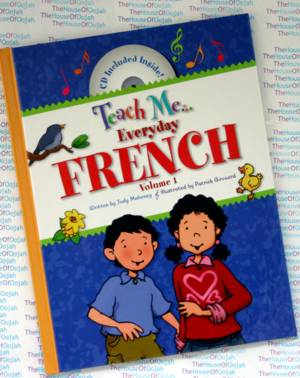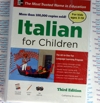Teach Me Everyday French - Volume 1 - Judy Mahoney

Teach Me Everyday FrenchVolume 1: Written by Judy Mahoney illustrated by Patrick Girouard |
 |
Teach Me Everyday French - Volume 1 - Judy Mahoney - Book and Audio CDBrand NewTeach Me Everyday is the newest title available from the award winning Teach Me series. Kids love to learn a new language! And what better way than through the joy of song! Teach Me Everyday contains a 32 page hard cover book, beautifully illustrated helping to capture your childrens attention and feed there imaginations! Accompanied by an Audio CD full of popular childhood songs. All songs are professionally recorded in French . The colour book contains full lyrics and translations in English. Teach your children basics. Covers vocabulary, numbers, alphabet, days of the week and much more. An invaluable recourse or gift to parents & teachers. About the French LanguageFor the period up to around 1300, some linguists refer to the oïl languages collectively as Old French (ancien français). The earliest extant text in French is the Oaths of Strasbourg from 842; Old French became a literary language with the chansons de geste that told tales of the paladins of Charlemagne and the heroes of the Crusades. By the Ordinance of Villers-Cotterêts in 1539 King Francis I made French the official language of administration and court proceedings in France, ousting the Latin that had been used before then. With the imposition of a standardised chancery dialect and the loss of the declension system, the dialect is referred to as Middle French (moyen français). The first grammatical description of French, the Tretté de la Grammaire française by Louis Maigret, was published in 1550. Many of the 700 words of modern French that originate from Italian were introduced in this period, including several denoting artistic concepts (scenario, piano), luxury items, and food. Following a period of unification, regulation and purification, the French of the 17th to the 18th centuries is sometimes referred to as Classical French (français classique), although many linguists simply refer to French language from the 17th century to today as Modern French (français moderne). The foundation of the Académie française (French Academy) in 1634 by Cardinal Richelieu created an official body whose goal has been the purification and preservation of the French language. This group of 40 members is known as the Immortals, not, as some erroneously believe, because they are chosen to serve for the extent of their lives (which they are), but because of the inscription engraved on the official seal given to them by their founder Richelieu—"À l'immortalité" ("to the Immortality (of the French language)"). The foundation still exists and contributes to the policing of the language and the adaptation of foreign words and expressions. Some recent modifications include the change from software to logiciel, packet-boat to paquebot, and riding-coat to redingote. The word ordinateur for computer was however not created by the Académie, but by a linguist appointed by IBM
From the 17th to the 19th centuries, France was the leading power of Europe; thanks to this, together with the influence of the Enlightenment, French was the lingua franca of educated Europe, especially with regards to the arts, literature, and diplomacy; monarchs like Frederick II of Prussia and Catherine the Great of Russia could both speak and write in French. During the 17th and 18th centuries, the French language established itself permanently in the Americas. There is an academic debate about how fluent in French were the colonists of New France. While a minority of colonists (mostly women) were from the region of Paris (approximately 20% of all colonists), most of them came from northern and western regions of France where French was not the primary language natively spoken by its inhabitants. It is not clearly known, however, how many among those colonists understood French as a second language, and how many among them – who, in overwhelming majority, natively spoke an oïl language – could understand, and be understood by, those who speak French thanks to interlinguistic similarity. In any case, a linguistic unification of all the groups coming from France happened (either in France, on the ships, or in "Canada") such that, according to many sources, the then "Canadiens" were all speaking French natively by the end of the 17th century, well before the unification was complete in France. Today, French is the language of about 10 million people (not counting French-based creoles) in the Americas. Through the Académie, public education, centuries of official control and the role of media, a unified official French language has been forged, but there remains a great deal of diversity today in terms of regional accents and words. For some critics, the "best" pronunciation of the French language is considered to be the one used in Touraine (around Tours and the Loire River valley), but such value judgments are fraught with problems, and with the ever increasing loss of lifelong attachments to a specific region and the growing importance of the national media, the future of specific "regional" accents is often difficult to predict. The French nation-state, which appeared after the 1789 French Revolution and Napoleon's empire, unified the French people in particular through the consolidation of the use of the French language. Hence, according to historian Eric Hobsbawm, "the French language has been essential to the concept of 'France', although in 1789 50% of the French people didn't speak it at all, and only 12 to 13% spoke it 'fairly' - in fact, even in oïl language zones, out of a central region, it wasn't usually spoken except in cities, and, even there, not always in the faubourgs. In the North as in the South of France, almost nobody spoke French." Hobsbawm highlighted the role of conscription, invented by Napoleon, and of the 1880s public instruction laws, which allowed to mix the various groups of France into a nationalist mold which created the French citizen and his consciousness of membership to a common nation, while the various "patois" were progressively eradicated. |
Teach Me Everyday French - Volume 1 - Judy Mahoney - Book and Audio CD |

 0 Items (Empty)
0 Items (Empty)



